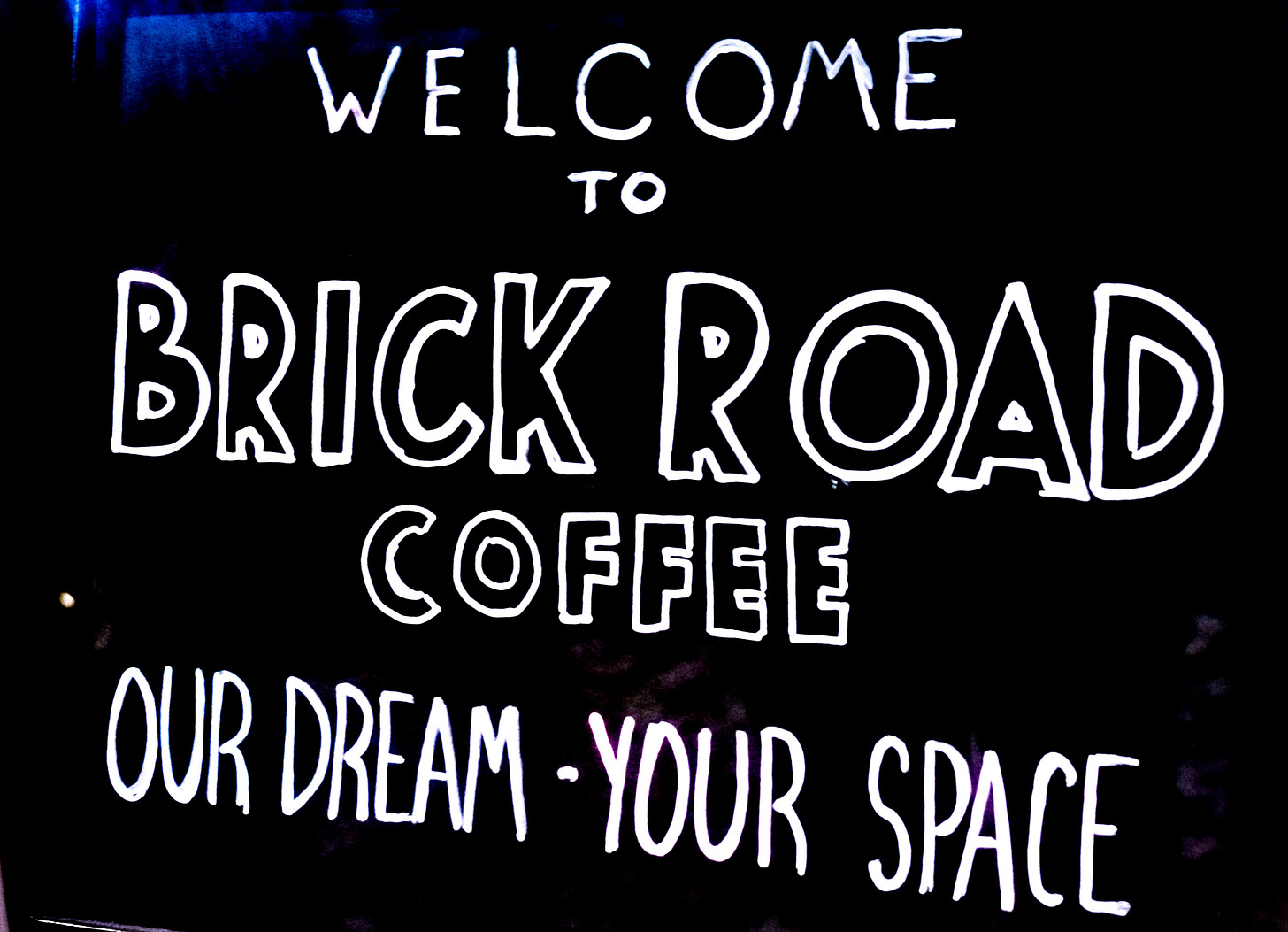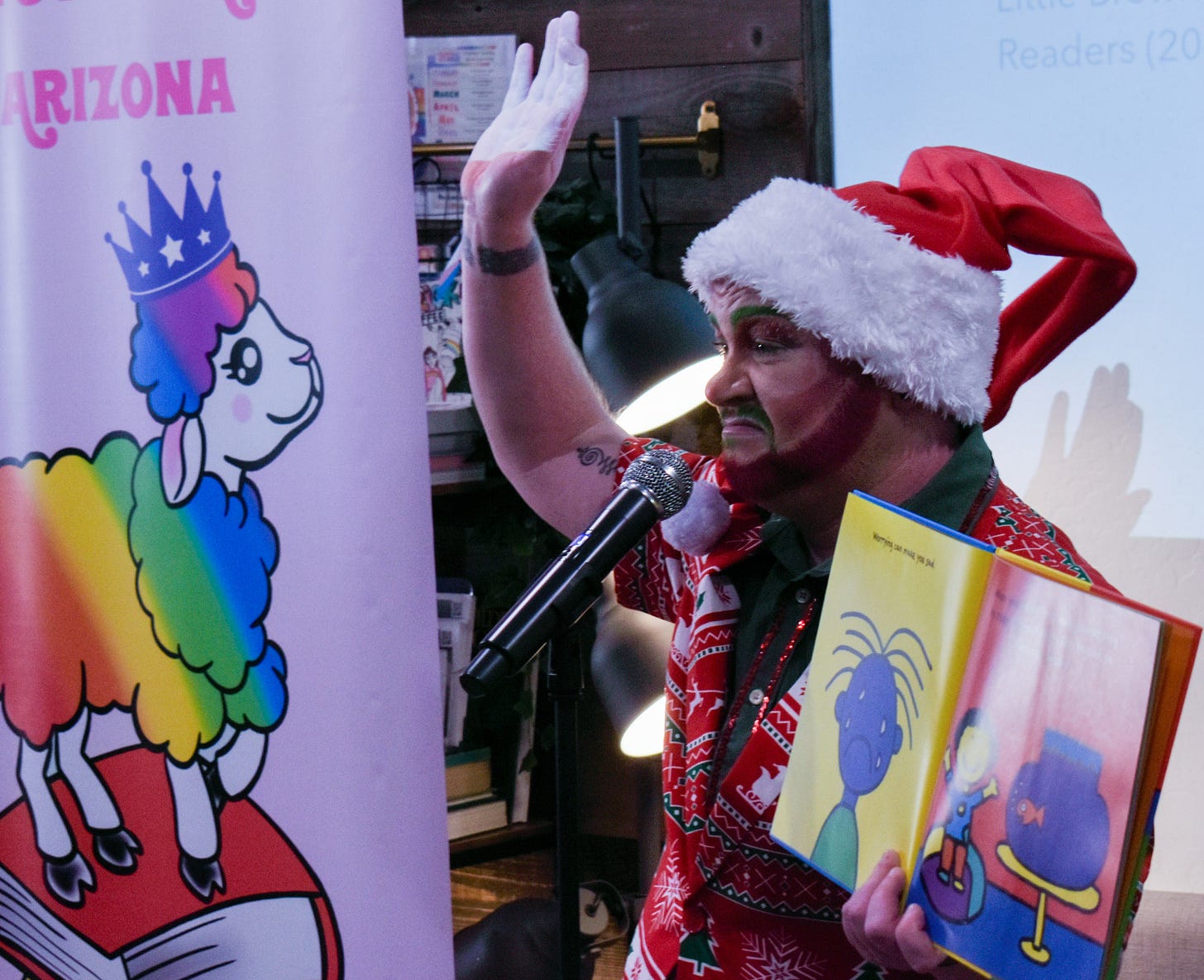Parents who evacuated their kids during drag story hour say lawmakers are the real danger
After a recent bomb threat at a coffee shop filled with children, parents and LGBTQ+ groups are pushing back against homophobic rhetoric amplified by Republicans.

Hannah Moulton Belec just wanted to take her kids to a performance surrounded by other children. A local coffee shop near where she lived had scheduled a drag story hour, and with a professional performer doing the reading, it was an opportunity to unplug for a bit.
“To even have an excuse to get out of the house and do anything that is welcoming of kids, knowing that they're going to run around, have a space to color, get space on the floor to let them kind of, like, wobble around and bring parents together to connect with each other was important,” she said. “And then, to have those kid friendly spaces be excellent purveyors of art, or, you know, literacy programming—that's a whole other level.”
But within an hour of being at the coffee shop, the mood shifted from playful and exciting, into trepidation.
A bomb threat was made to the coffee shop, which at that point had filled up with children and their parents.
“I didn't know if we should stay or not, because I don't want to show my kids that we give into this kind of terrorism,” Moulton Belec said. “But, like, I also want them to be safe.”
Eventually the business had to empty out and close its doors for the day. A win for the religious-right which has done just about everything in their power to shut down these kinds of performances from happening, even on private property as this had been.
But bomb threats aren’t the only threats levied against places like Brick Road Coffee, which is a regular host of Drag Story Hour-AZ. The threats to performers’ and small business’ bottom line is being done directly in tandem while legislation is brought on by three different senators: Justine Wadsack from Tucson, Anthony Kern from Gilbert, and John Kavanagh from Fountain Hills.
Though the lawmakers say that their bills are only targeting drag shows that are inappropriate for children, a true reading of the bills’ broad language makes it easy for anyone, such as protesters, to call police and file complaints against even the most innocent performances, like the ones done during drag story hour. The three have also used a spat of language to describe people who perform drag as “groomers” who want to have sex with kids, or part of a gay “propaganda” campaign, or “perverted,” as one lawmaker described drag performers.
But while state lawmakers have tried to push Arizona to the front of the nation’s culture wars by passing laws that will surely die at the governor’s desk, the benefits and education behind drag story hour has been lost.
Lawmakers have been focused on trying to malign drag as an inherently sexual art form, but the drag done during story hours is based on an understanding of how school-aged kids grasp reading comprehension through performance and active engagement. It also highlights stories that aren’t typically read inside of schools, such as issues on gender, race, or religion. And parents who take their children to readings say they take their kids in the hopes of learning empathy toward people who are different from them.
That, though, is all at stake. Now, parents are worried about them and their children’s safety.
“I was just shaken up,” Moulton Belec said. “I've never been in a situation like that with my kids.”
“You spend so much time like trying to nurture them and keep them alive and thriving, but like, the idea that I would bring them to a place that where they would be in danger is just, like, there's just so much to that emotionally,” she said.

While there are, indeed, drag shows that have sexual aspects incorporated into their performance, those shows are already restricted by the state’s cabaret laws, and done in adult settings.
In spite of current law, Republican lawmakers have tried to push legislation to label all drag as a cabaret performance, to which children wouldn’t be able to see. Some bills have attempted this by giving people—even protesters—the decision on what is “obscene” or “prurient.”
Yet, the drag done inside libraries or children’s shows is far from even the most conservative definitions of obscenity, with performers dressed sometimes in full gowns or entire costumes that cover every part of their body.
The entire purpose of story hour is to mix reading with lessons of cultural acceptance, said David Boyles, the president of Drag Story Hour-Arizona, the local chapter of the national nonprofit, Drag Story Hour.
“Our executive director is someone with a background in children's literacy, and when a performer wants to work with us, we do literacy training with them,” said Boyles. “We have a team of people who are educated in early childhood backgrounds, who develop the curriculum, pick the books, all that kind of stuff.”
Put plainly, drag performers don’t show up in leather harnesses and read Michel Foucault.
“It really is a deliberate literacy program that is rooted in just being very traditional children's literacy, ideas and research,” Boyles said.
But that kind of literacy program doesn’t jive well with far-right Republicans pushing anti-LGBTQ+ legislation, which are carbon copies of bills being passed in Tennessee, Arkansas and South Carolina.
In a recent committee hearing Sen. Christine Marsh (D-Phoenix) challenged Sen. Anthony Kern on where he got the bill text from for his anti-drag legislation, and if he was handed the bill from anyone in Tennessee. Kern scoffed at the question and said only that he was inspired by it.
And when advocates have tried to challenge that conservative lawmakers are harming children, they’ve been shot down.
In a Senate Government Committee, senator Jake Hoffman wouldn’t allow a speaker to testify about how drag story hour was created as a literacy program for children.
But parents who take their kids to drag story hour events see a marked improvement in their children’s understanding of reading, and also appreciate a space that promotes their values of acceptance among different genders and groups of people.
Julie Bufkin, who takes her 3-year-old son to the drag story hour at Brick Road Coffee, said she wanted to be sure he was able to learn in an environment that works best for him, while also being part of an event that taught acceptance and tolerance.
“The ideas that they're sharing about inclusivity, radical self acceptance, even self regulation and thinking about different perspectives,” were important to her, she said.
And because the event happened at a private venue, the crowds were tinier, and she knew her son learned best in small group environments.
She also recognized that taking her child to the events was, in itself, a form of protest—another value she wanted to instill in her child.
She said she’s walked her son through protests with Proud Boys, and evangelical church goers who scream at attendees. And even though they are working to intimidate her and her son, “The bottom line is, they're not scaring me,” she said.

In the past, protesters have been kept at a distance. But this month’s bomb threat, along with a recent event where Ethan Schmidt—a violent homophobe who has gained support from far-right lawmakers—had to be removed, parents and community advocates have become worried, and are making a point to blame lawmakers for normalizing anti-LGBTQ+ rhetoric.
House Representative Lorena Austin said conservatives were trying to eliminate drag from the few private businesses left that provide safe spaces for queer youth. Progress Arizona, a progressive advocacy group, specifically named Kavanagh, Kern and Wadsack as perpetuating the violence. And Bridget Sharpe, Arizona state director for Human Rights Campaign said bills, such as Kern’s, pushes misinformation and hate toward an already marginalized and underrepresented community.
“The Arizona GOP has gone too far, and we cannot allow them to retain power in our state,” she said in a statement.
But Kavanagh—who has long tried to pass bans to limit the expansion of LGBTQ+ rights and queer visibility in Arizona, going as far back as introducing one of the nation’s first bathroom bills that sparked threats against both trans and gender nonconforming people—said that he is the real victim.
“It's truly ironic that a group that claims that my language incited violence, and falsely attributes the violence to me, could incite violence against me,” he said to LOOKOUT. “They're doing the exact same thing that they claim I'm doing.”
In a 15-minute phone call, Kavanagh condemned the bomb threat, but continued to claim that drag story hour was “attempting to gain acceptance for drag queens.” He said the program was part of a coordinated propaganda campaign to confuse children.
“People are cross dressing and engaging in exaggerated gender specific behaviors, which I think children will find confusing and disturbing,” he said. “And it also is obviously an attempt to propagandize them.”
He also said that Gov. Katie Hobbs would face scrutiny if she didn’t sign one of his bills, which bans government money—such as art grants—from financing art programs if there is drag involved, and bans performances on all government property—such as during Pride events—if they “target” children.
That bill, in unison with the other bills passed through the Capitol, could give far-right evangelicals the power to claim obscenity on any kind of gender nonconforming performance they see in public.
“She has to go on record as saying, ‘I have no problem with drag shows targeting children being paid for by taxpayer dollars',” Kavanagh said.
Kavanagh’s comments, though, have parents such as Hannah Moulton Belec enraged, but hopeful. She said she hoped the recent bomb threat showed some on the right that their tactics are more harmful to kids than the drag they claim is.
“I think that anyone who has those fears, I hope that they see this kind of threat against a cafe full of babies, and mostly moms, that this is the end result of the anxieties they traffic in,” she said. “Because they do traffic them in.”
LOOKOUT is Phoenix’s ONLY nonprofit news site dedicated to covering queer issues. If you enjoyed this story and the kind of coverage we provide, consider a donation to keep this kind of local coverage alive in your city.





